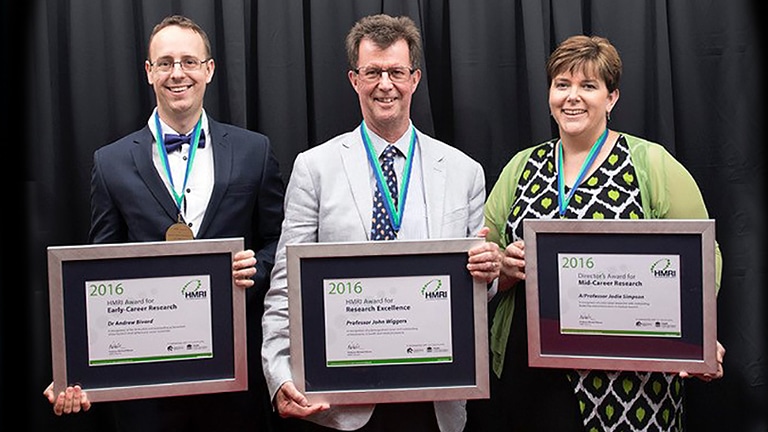
Population health trailblazer Professor John Wiggers has been named the Hunter’s top researcher for 2016 at the annual HMRI Awards Night, capping a highly successful evening in which $3.6 million in philanthropic support was announced or acknowledged.
Population health trailblazer Professor John Wiggers has been named the Hunter’s top researcher for 2016 at the annual HMRI Awards Night, capping a highly successful evening in which $3.6 million in philanthropic support was announced or acknowledged.

Included were 58 project grants, six scholarships, four early-career support grants and six travel grants.
The prestigious Award for Research Excellence recognises Professor Wiggers’ unwavering commitment to reducing the chronic disease risks imposed by smoking, poor nutrition, alcohol consumption and inadequate physical activity.
He has secured over $40 million in grant income, including $15 million in the past 5 years, to expand his group from a single staff member to 7 research fellows and 10 post-doctoral researchers. His contribution to 200 peer-reviewed research manuscripts places Professor Wiggers among the highest performing academics in his field, internationally.
“The task of implementing behavioural change to alleviate today’s chronic health issues is a challenging one. It takes someone with John’s respectful and methodical research approach to succeed,” HMRI Director Michael Nilsson said.
“The research-practice partnership he pioneered between the University of Newcastle and Hunter New England Population Health was, and still is, ahead of its time. It has been transformative to public health services, thanks to John’s ability to harness support from policymakers and community organisations like schools, licenced premises and workplaces.”
Most recently the Wiggers team’s Physical Activity for Everyone study, implemented in disadvantaged high schools, was one of the few interventions globally to attain a significant increase in physical activity among teenagers. Last month it won a 2016 NSW Health Award.
Locally, Professor Wiggers holds leadership positions as the Director of Hunter New England Population Health, Director of the UON Priority Research Centre for Health Behaviour and Co-Director of the HMRI Public Health Capacity Building Program.
Respiratory researcher Associate Professor Jodie Simpson became the first woman to win the HMRI Director’s Award for Mid-Career Research, which was introduced in 2014 to recognise researchers within 15 years post-PhD.
Associate Professor Simpson has carved an international research niche by focusing on airway inflammation caused by neutrophils, which are white blood cells that fight infection. In some respiratory patients, neutrophils persist in the airways and cause poor lung function.
Her fundamental and paradigm-shifting observations have helped change the way asthma is clinically defined and treated.
Associate Professor Simpson is now co-leading the AMAZES study, the largest study of non-eosinophilic asthma in the world. Her research output comprises 5500 citations, 86 publications in leading journals and a research income of over $7.3 million.
The HMRI Award for Early-Career Research went to Dr Andrew Bivard for his work in acute ischemic stroke imaging, which focuses on patient selection for clot-busting therapies. Together with industry partners, the 29-year-old developed an automated processing program for cerebral perfusion imaging.
With stroke also being a leading cause of disability, Dr Bivard is now coordinating the MIDAS Fatigue Trial at HMRI using the drug Modafinil to assist stroke survivors in overcoming persistent tiredness.
“These awards and grants are the result of incredible generosity from the Hunter community and industry supporters, with over 31,000 donations being given to HMRI in the past year,” HMRI Chairman Glenn Turner said.
“Funding is the linchpin in the translational research cycle, allowing scientists, clinicians and public health researchers to turn ideas into new medications, devices and treatment approaches.
“It has seen HMRI grow rapidly to become one of NSW’s largest research institutes and the region gain some of Australia’s biggest clinical trials and projects, from asthma to cancer, cardio to dementia.”
Click here for a full list of winners from the HMRI Awards Night 2016
* HMRI is a partnership between the University of Newcastle, Hunter New England Health and the community.
HMRI would like to acknowledge the Traditional Custodians of the land on which we work and live, the Awabakal and Worimi peoples, and pay our respects to Elders past and present. We recognise and respect their cultural heritage and beliefs and their continued connection to their land.

Hunter Medical Research Institute
We’re taking healthy further.
Locked Bag 1000
New Lambton
NSW, Australia, 2305



This site is protected by reCAPTCHA and the Google Privacy Policy and Terms of Service apply.
Copyright © 2024 Hunter Medical Research Institute | ABN: 27 081 436 919
Site by Marlin Communications
